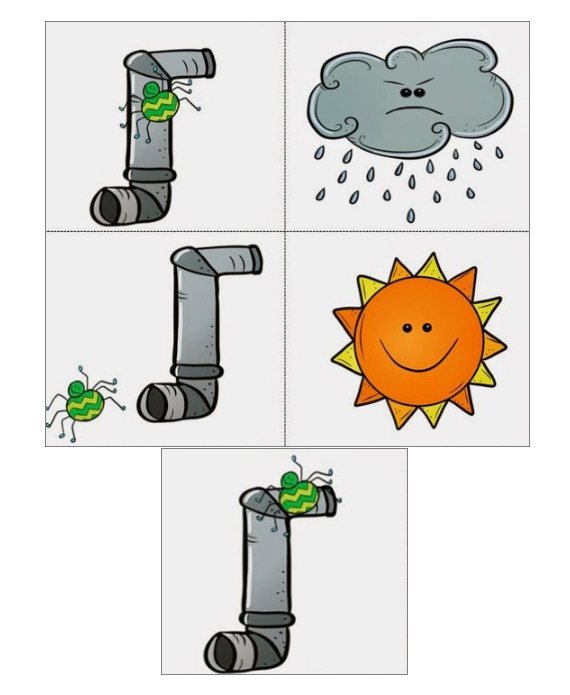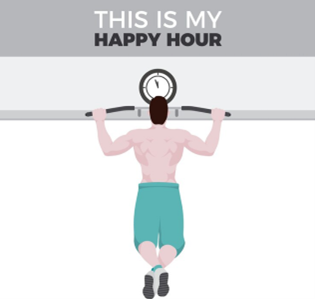Struggle Gives Life Meaning: Nihilism and the Itsy Bitsy Spider
Embrace the spirit of this joyful warrior in your sobriety journey
The itsy bitsy spider nursery rhyme is so ubiquitous you probably sang it when reading the title of this post. The traditional melody and obligatory tickling communicate a quaint and unassuming picture of the little spider that could. However, when inspected closely, the song reveals the tragic story of a hardier, more formidable character.
In fact, the spider’s adventures align identically with the unfortunate story of Sisyphus. As a refresher, Sisyphus was a Greek god eternally condemned to endlessly push a massive boulder up a mountain, only to watch it roll back down just before reaching the summit.
The spider suffers the same fate, forever climbing the steep spout only to be perpetually thwarted by the pesky rain.
Viewed in this light, the story seems unsuitable for children. In reality, it carries a compelling message, particularly concerning sobriety.
Nihilist philosopher Albert Camus argues human suffering results from trying to ascribe meaning to the chaos of reality.
In his essay “The Myth of Sisyphus,” Camus contends purposeful living involves accepting life’s absurdity and finding happiness in the struggle:
One always finds one’s burden again…The struggle itself toward the heights is enough to fill a man’s heart. One must imagine Sisyphus happy.
On the one hand, this is a valuable suggestion. Since most of us lack precognition, isolated events often appear random based on our limited perspective. By finding contentment in the fight, we can endure life’s nonsense.
His advice is satisfactory but not particularly uplifting because Camus fails to see the truth.
Our lives are not pure Sisyphian myths — Unlike Sisyphus and the spider, we are not condemned to a life of repeating the same arduous cycle.
In hindsight, we know periods of triumph always punctuate times of struggle. The obstacles themselves are what make victory so sweet.
Camus would argue that retrospective positivity stems from existential angst — rationalizing an experience eases the emotional discomfort of living in a world of senseless pain.
Even if we accept this premise, it doesn’t undermine the effectiveness of the approach.
For instance, I struggled to rationalize initially failing the bar exam. During those first 90 days of sobriety, studying felt like a Herculean task, and I was frustrated that the challenges of early recovery might have compromised my ability to study effectively.
Choosing to retake the exam, I was forced to push the same intellectual boulder up the same daunting hill. At that moment, I definitely viewed life as a Sisyphean tragedy.
However, there was a benefit to my failure.
Had I passed the exam, I would have begun working at a large law firm. The additional pressure would have been emotionally and psychologically draining during early sobriety, a particularly fragile period. With more time to solidify my sobriety, I was on firm ground as I prepared for the exam again.
Moreover, the downtime allowed me to pursue my passion for writing, something I wouldn’t have done had I passed.
The more I view my life as a coherent narrative, the easier it becomes to apply Camus’ advice and find joy in the struggle. Understanding that the absurdity will eventually make sense provides the determination to push through despite the discomfort.
The spider’s neverending journey is an allegory for life and, more specifically, the sobriety journey.
Initially, we pursue recovery with excitement and vigor. In those early days, when our disease resurfaces, it's like being blinded by the sun as we struggle toward the seemingly unattainable goal of continuing sobriety.
Sweaty and exhausted, we notice rain clouds gathering in the sky beckoning us to admit defeat.
Bracing for impact, we hold steadfast as gigantic raindrops of limiting beliefs pummel our minds. Unable to withstand the mental cannon fire, we plummet to the ground dejected and discouraged. We start to question our decision to get sober and doubt whether we have the strength to keep going.
As the Sun reappears, we’re faced with a pivotal choice: give up and drink or persist.
We recall the unforgettable tale of the intrepid spider and summon the resolve to persevere. We ready ourselves to resume the quest armed with useful insights from the first fall:
The road is steep.
The Sun is hot.
The raindrops are unforgiving.
We can survive.
Weathered and wiser, we take a page from Camus’ book and relish the experience. Practicing gratitude, we listen to the joyful sounds of the birds flying around us. Under the scorching Sun, we acknowledge how much faster our pace is. When the raindrops inevitably fall, we appreciate the strength of our tighter grip. Having surrendered to the process, we feel at peace as we tumble to the earth again.
Laying on our backs, we see a rainbow shoot through the clouds. We finally understand that lasting sobriety is a marathon, not a sprint.
We smile knowingly because we’re starting to perceive our experience in the same way.
As we dust ourselves off and jump to our feet, we spot an itsy bitsy companion on our shoulders, preparing itself for the next ascent.
We realize we’re never alone and are stronger than we ever imagined.
Life is good.








Really enjoyed your article. I would not have found you except for your invitation for others to introduce themselves. Thanks
Good article! You got me thinking about something. Even Sisyphus only suffers if he believes there is something required of him. And thus he suffers because he cannot achieve it. He could choose to make it a contemplative practice, and it would become a meditation. And he could find peace in it. Or he could simply choose not to do it. Give up his resistance, and let the rock fall to the bottom of the hill, And knowing that in doing so, it would no longer have any power over him.